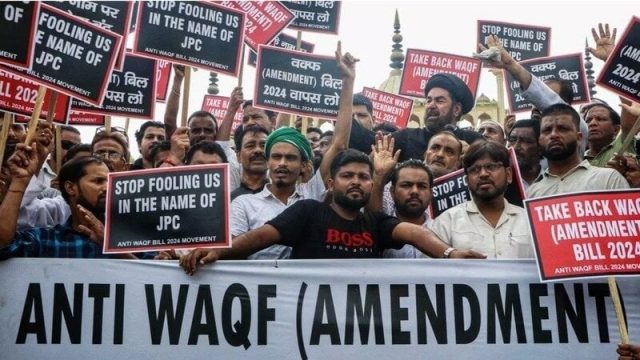In a significant move, during the first session of the 18th Lok Sabha, on 8th August, BJP’s minority affairs minister Kiren Rijiju introduced the Waqf Amendment Bill 2024. On the same day, this bill was referred to a joint parliamentary committee. On 22nd August, the first meeting of this joint parliamentary committee was also held. If the Waqf bill is passed then many important changes will happen in the Waqf Act of 1995 and the name of the act will also change to United Waqf Management, Empowerment, Efficiency and Development Act, or UMEED.
Waqf: A Pillar of Socio-Religious Life
The concept of waqf, an Islamic endowment, has been a cornerstone of socio-religious life in our country for centuries, and is the third-largest landowner in the country. waqf basically means the permanent dedication by a person professing Islam i.e., Muslim, of any movable or immovable property for any purpose recognized by the Muslim law as pious, religious, or charitable. waqf properties, ranging from mosques and graveyards to schools and hospitals, are intended to serve the public good, particularly of the Muslim community.
An example of the significance of waqf properties comes from an account recorded in the journal of the 14th-century traveler Ibn Battuta, which describes how in Damascus if a waiter in a hotel broke an expensive porcelain dish, the cost of the damage was covered not from the waiter’s salary but from the wealth of the waqf properties. This highlights the role of waqf in supporting not only religious activities but also in providing a safety net for individuals and communities, as done in India by waqf providing maintenance to a divorced Muslim woman who is unable to maintain herself and has no such relatives, or the relatives do not have enough means to pay maintenance.
However, over time, these properties have become entangled in issues of mismanagement, encroachment, and lack of transparency. Even after the Waqf Act was passed in 1995 to ensure the appropriate administration and protection of these estates, these problems still persisted and were also highlighted in the Sachar Committee report in 2006, which prompted calls for further reforms.
Misconceptions and Propaganda Surrounding Waqf
Prior to discussing the proposed amendments, it is critical to dispel the misconceived notions that are widely held and that right-wing organizations have promoted on social media regarding waqf properties. One of the most widespread misconceptions is that waqf functions as a “state within a state,” exempt from governmental and judicial control and able to claim any territory in the name of Allah. This story has been spread to incite hatred and sow doubt about waqf institutions.
But the truth is much more nuanced. First of all, only you can waqf your property, which means you cannot claim anyone’s property as waqf but there are various allegations and therefore it was included in section 40 of the Waqf Act 1995 that says that if a state’s waqf board thinks that a property is theirs, then they can take initiative and collect information from the public, conduct survey to find out if the property belongs to waqf, but it is not easy to prove the waqf identity of the property. Under section 4 of the Waqf Act 1995, the land can be examined by the survey commissioner to find out the objectives of the waqf and has the power to ask for a document to prove the ownership of the land. Legal scholars say that it is difficult to do so because you can also give the land under the waqf verbally under Islamic law and often there are no written documents or signatures, so how will you prove that the property is of waqf or not? On top of that, according to section 14 of the Waqf Act 1995, the members of the state waqf board, almost all the members are nominated by the state.
Furthermore, contrary to the idea that these organizations function independently of governmental supervision, the majority of the nominees for the state waqf boards and the Central Waqf Council are chosen by the government, these boards are basically run by the government. The image that there is no role of government, no oversight, and no state within the state, is completely wrong. There are also allegations that waqf works within the state, running sharia law in the country and waqf laws are Islamic laws, no relation to the Indian constitution is also slightly wrong because according to legal scholars, waqf is the most codified Muslim law. waqf works according to the law made by the parliament and runs according to the nominated officers of the government. As such, the notion that waqf functions as a “state within a state” is a flagrant fabrication of the truth.
Another widespread misunderstanding is that waqf has the authority to act unilaterally and is not subject to judicial oversight. This is also wrong because when there is a dispute a tribunal is established as per the act which is a quasi-legal body with the same powers as the civil courts. The waqf tribunals’ members are nominees of the government, a state judicial service member, a state civil services member, and a person who understands Muslim law and jurisprudence. There is no restriction on the government from nominating only a Muslim. The government can nominate a Hindu, a Parsi, and anyone who is well-versed with Muslim Law. The High Court can take Suo moto cognizance of a Tribunal’s decision and if it feels that the tribunal has made a wrong decision, it can be changed and challenged. The high court can reverse the decision of the tribunal, so there is judicial oversight. All in all, there is government oversight, judicial oversight, and the codified act.
The Waqf Amendment Bill: Genuine Reform or a Strategic Move?
We must evaluate the Waqf Amendment Bill 2024 closely in light of these myths. According to the government, the bill will deal with the fundamental problems of encroachment, inefficiency, and corruption. However, a closer look at the proposed amendments raises several red flags.
The bill’s addition of two Muslim women to the Central Waqf Council—a suggestion that was also included in the Sachar Committee report—is one of its better features. This is a positive step that will guarantee more diversity and representation in the council. Furthermore, although not novel, the measure requires two non-Muslim members of the Central Waqf Council, which, while not unprecedented, raises the question about representation. If the government advocates for “one nation, one law” and no religious representations, then this principle should apply uniformly, including to Hindu temple boards, where non-Hindus are often ineligible for membership.
The most controversial aspect of the bill is the proposed elimination of Section 40 of the Waqf Act 1995, which gives the Waqf board the authority to investigate land ownership. The amendment’s proponents contend that eliminating Section 40 will stop situations such as the one that occurred in Tamil Nadu, where a local wanted to sell his land and discovered the area was under the waqf Board. Critics, however, argue that this section is essential for protecting waqf properties from encroachment and misappropriation. It is worth noting that the surveyors and commissioners involved in these processes are government employees, raising questions about the true cause of any alleged misdeeds. What is more worrisome is the government’s plan to give the Collector the ability to determine whether properties are waqf, taking over from the Survey Commissioner. This reduces the authority of waqf tribunals and surveyors by centralizing power in the hands of government officials. This modification raises severe questions about the impartiality of the decision-making process, as the Sachar report highlights the multiple instances in which the government has been accused of intruding on waqf properties. In cases when there is disagreement over waqf holdings, how can we expect a Collector nominated by the government to rule against the government?
This amendment is even more dangerous when we look at the process of digital registration. Digital registration is a must, the Sachar report said this many years ago. If the bill is passed in accordance with the amendment, then the waqf properties must be registered within 6 months and if they are not registered within 6 months then they will not be considered as waqf properties and no case can be filed, this means that judicial review is being excluded. We all know that in India, not just rural but even in urban areas, digital registration of properties is not possible in 6 months. If there comes pressure from above or a missing document then registration is impossible. This clearly shows the intention of the government and as pointed out by many leaders including Asaduddin Owaisi, that this digitization is effectively a land grab. Also, the government is imposing a collector rule on it which will not take a decision against the government.
The Sachar report showed a way forward from its side as well such as strengthening the waqf board, giving a full-time judicial presiding officer to the waqf tribunal, defining encroachers immediately and taking action against them, etc., but the bill has not focused on all these. Kiren Rijiju has only taken a few parts of the research and the data of the Sachar committee and used them selectively.
The Broader Implications
After considering the various aspects of the Waqf Amendment Bill 2024, it is difficult not to feel skeptical about the government’s intentions. Could these amendments pave the way for the mass appropriation of waqf properties under the pretext of development? The increased centralization of power seems like a potential threat to the autonomy of the Muslim community in managing its own assets. Furthermore, the digitization of records, while beneficial in theory, could be manipulated or used selectively to dispossess communities of their rightful properties. The lack of transparency and accountability in past government initiatives only deepens these concerns.
The discussion surrounding the waqf amendments highlights the necessity to strike a careful balance between development and the preservation of cultural and religious heritage. The administration of waqf properties clearly needs reform, but any changes must be made carefully to avoid unintentionally undermining the rights and autonomy of the Muslim community. To address the concerns about these planned changes, a consultation approach including all stakeholders—religious leaders, community representatives, and legal experts—is necessary. Any legislative reform must include clear communication, transparent procedures, and protections against potential abuse.
In the end, the issue still stands: Are these changes actually required, or are they just a front for larger goals hidden under a veil of progress? The answer lies in the crooked intention of the government as mentioned above and the amendment if passed by the parliament may become another chapter in India’s lengthy history of land disputes and marginalization.






